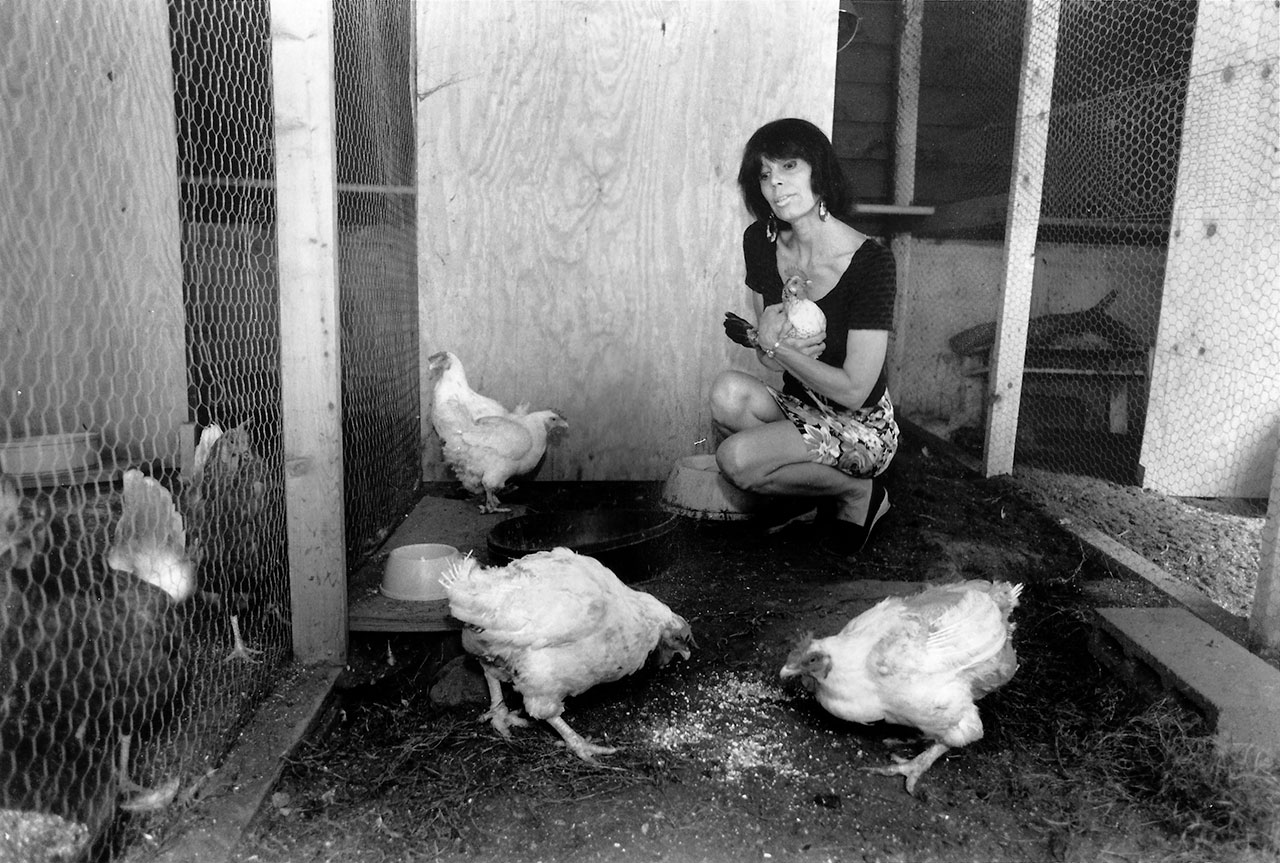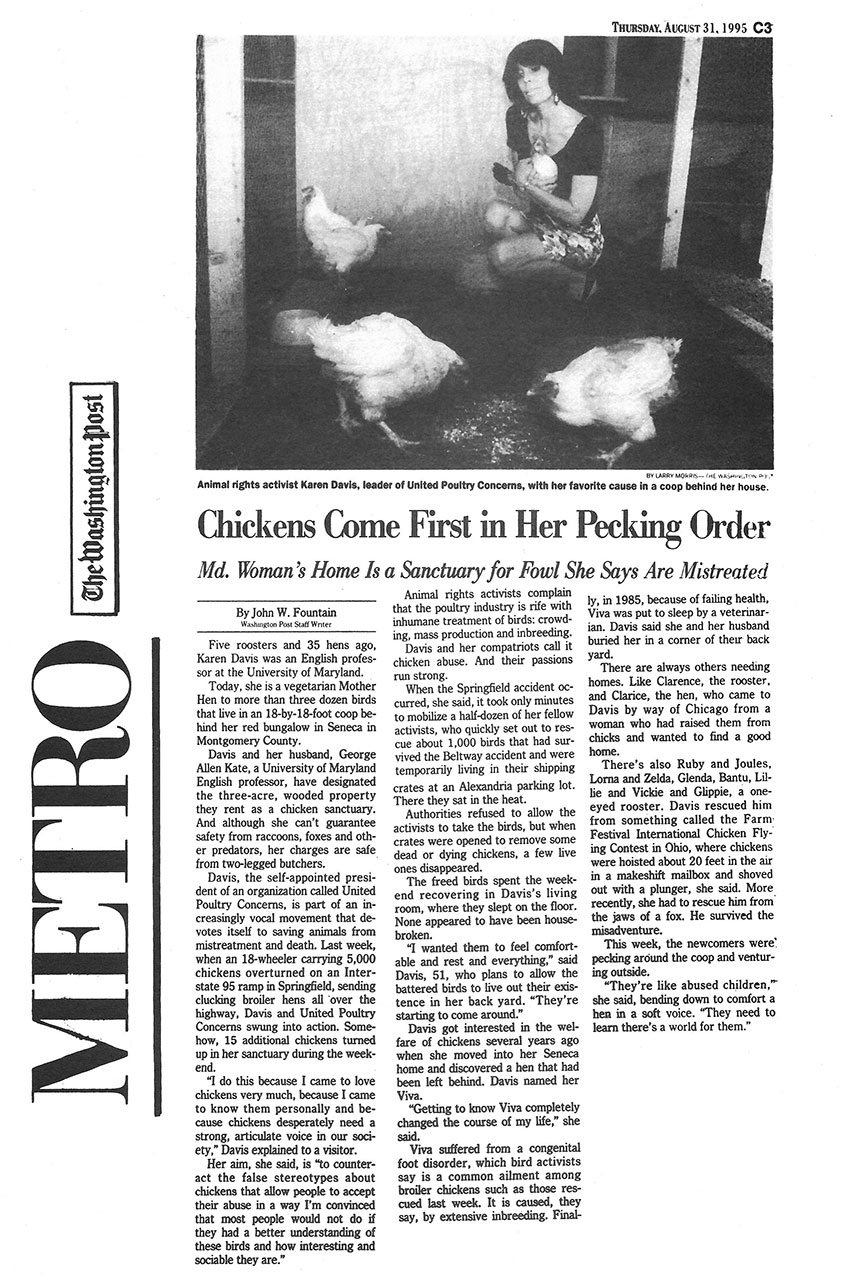Chickens Come First in Her Pecking Order
The Washington Post Metro, Thursday August 31, 1995, C3

Photo by Larry Morris – The Washington Post
Animal rights activist Karen Davis, leader of United Poultry Concerns, with her favorite cause in a coop behind her house.
Md. Woman’s Home Is a Sanctuary for Fowl She Says Are Mistreated
By John W. Fountain
Washington Post Staff Writer
Five roosters and 35 hens ago, Karen Davis was an English professor at the University of Maryland.
Today, she is a vegetarian Mother Hen to more than three dozen birds that live in an 18-by18-foot coop behind her red bungalow in Seneca in Montgomery County.
Davis and her husband, George Allen Cate, a University of Maryland English professor, have designated the three-acre, wooded property they rent as a chicken sanctuary. And although she can’t guarantee safety from raccoons, foxes and other predators, her charges are safe from two-legged butchers.
Davis, the self-appointed president of an organization called United Poultry Concerns, is part of an increasingly vocal movement that devotes itself to saving animals from mistreatment and death. Last week, when an 18-wheeler carrying 5,000 chickens over turned on an Interstate 95 ramp in Springfield [Virginia], sending clucking broiler hens [and roosters] all over the highway, Davis and United Poultry Concerns swung into action. Somehow, 15 additional chickens turned up in her sanctuary during the weekend.
“I do this because I came to love chickens very much, because I came to know them personally and because chickens desperately need a strong, articulate voice in our society,” Davis explained to a visitor.
Her aim, she said, is “to counteract the false stereotypes about chickens that allow people to accept their abuse in a way I’m convinced that most people would not do if they had a better understanding of these birds and how interesting and sociable they are.”
Animal rights activists complain that the poultry industry is rife with inhumane treatment of birds: crowding, mass production and inbreeding.
Davis and her compatriots call it chicken abuse. And their passions run strong.
When the Springfield accident occurred, she said, it took only minutes to mobilize a half-dozen of her fellow activists, who quickly set out to rescue about 1,000 birds that had survived the Beltway accident and were temporarily living in their shipping crates at an Alexandria parking lot. There they sat in the heat.
The freed birds spent the weekend recovering in Davis’s living room, where they slept on the floor. None appeared to have been housebroken. [Chickens in a Truck Accident (1995) youtube.com]
“I wanted them to feel comfortable and rest and everything,” said Davis, 51, who plans to allow the battered birds to live out their existence in her back yard. “They’re starting to come around.”
Davis got interested in the welfare of chickens several years ago when she moved into her Seneca home and discovered a hen that had been left behind. Davis named her Viva.
“Getting to know Viva completely changed the course of my life,” she said.
Viva suffered from a congenital foot disorder, which bird activists say is a common ailment among broiler chickens such as those rescued last week. It is caused, they say, by extensive inbreeding. Finally, in 1985, because of failing health, Viva was put to sleep by a veterinarian. David said she and her husband buried her in a corner of the back yard.
There are always others needing homes. Like Clarence, the rooster, and Clarice the hen, who came to Davis by way of Chicago from a woman who had raised them from chicks and wanted to find a good home.
There’s also Ruby and Jules, Lorna and Zelda, Glenda, Bantu, Lillie and Vickie and Glippie, a one-eyed rooster. Davis rescued him from something called the Farm Festival International Chicken Flying Contest in Ohio, where chickens were hoisted about 20 feet in the air in a makeshift mailbox and shoved out with plunger, she said. More recently, she had to rescue him from the jaws of a fox. He survived the misadventure.
“They’re like abused children,” she said, bending down to comfort a hen in a soft voice. “They need to learn there’s a world for them.”
